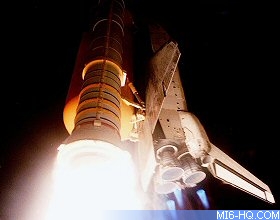 |
| |
Some interviews promise you the moon - this one
delivers! This week MI6 caught up with John Grover,
Assembly Editor
on
"Moonraker"...
| |
Interview - John Grover (Part 1)
9th September 2003
MI6 had the chance this week to chat to John Grover about his
work on "Moonraker". In this two part interview we
will discuss his memory of the film and look back at his career
so far...
Starting Out...
How did you start out in the movie business?
I had an uncle who was supervising editor at MGM Studios when
I applied to start as a numbering boy aged 21 after finishing
my National Service. There was no shortage of jobs but the pay
was terrible until you got a Union ticket, and you could not get
a ticket without a job; and everybody started right at the bottom.
It was a very good apprenticeship.
 |
|
What is an Assembly Editor?
An Assembly Editor (AE) is an editorial position between assistant and editor;
it is usually filled by a senior experienced assistant and usually only on
larger films that can afford them in the budget!
An AE is usually given sequences
that involve large amounts of cover, which means that the sequences have
been shot from many angles with many takes.
Left: The Space Shuttle appeared in Moonraker
in 1979 before it was officially launched by NASA. |
The AE will use his skills to sort through
the mass of film and present it for a viewing with the editor.
The editor is then available to talk it over with the AE and
get
him to adjust it or try other takes or angles, it helps the
editor to plough through masses of film in order to get the picture
into
some sort of shape, some times the AE comes up with different
ideas, but it does not mean that in the end the editor does
not
have to see all the cover. They work in conjunction with each
other; the AE sometimes also has to put trailer material together,
and sequences that might be needed for promotional purposes.
The
editor always supervises the AE.
Moonraker
At what stage did you come on to the project?
I probably came
on to "Moonraker"
two or three weeks before start of shooting, we had to set up
the cutting rooms and equipment in Paris, some library material
had to be
looked at, space stuff etc. Playback and process material had
to be organised.
How did you end up working on the "Moonraker" film?
John Glen asked me to assist him on "Moonraker";
it was a very complicated film and was shot in France.
|
Was there any footage which you can remember was missing
from the film cut?
"Moonraker",
was a space picture, space like underwater films are slow,
a lot was skip framed to make it seem faster, I don't think
any complete sequence was deleted from the film, I don't
really remember, bits were cut but it was a long time ago.
To
delete a complete sequence can destroy the story as
the sequence usually tells part of the ongoing story, deletions
are made in the pre-production and script writing period
so that money is not wasted in a sequence that will
end
on the cutting room floor. |
|

Above: John Grover at his home in the
South of England |
How much footage was shot for Moonraker?
Probably 800000 feet maybe more. On feature films 35mm film
normally runs at 24 frames per second. 90 feet per
minute.
High speed stuff in the camera to slow the action down when screened
varies, as does slow speed stuff to speed the action up!
Basically 800,000 feet of film would run for 148 hours!
Rushes viewed each day from several shooting units was usually
about an hour.
High speed camera stuff, like big explosions, was usually pre-edited
before
viewing to get rid of all the run up film.
How closely did you work with Lewis Gilbert and John Glen?
I
worked very closely with John Glen the editor for the shooting
period when the film was being assembled; we viewed the film
rushes
every day with Lewis Gilbert the director. We all worked closely
together during the final cutting period.
Keep an eye out for the second part of the interview where we
continue to chat more about "Moonraker" and his favourite
Bond film.
Many thanks to John Grover.
Related Articles:
 Interview - John
Grover (Part 2)
Interview - John
Grover (Part 2)
 MI6 "Moonraker"
Coverage
MI6 "Moonraker"
Coverage